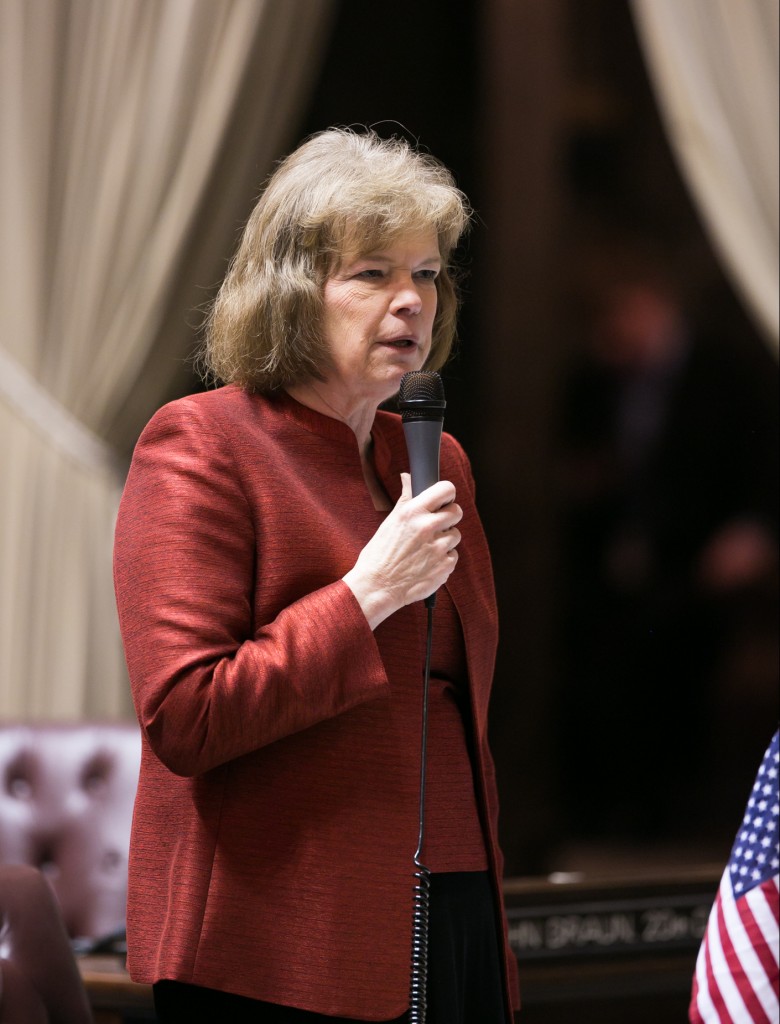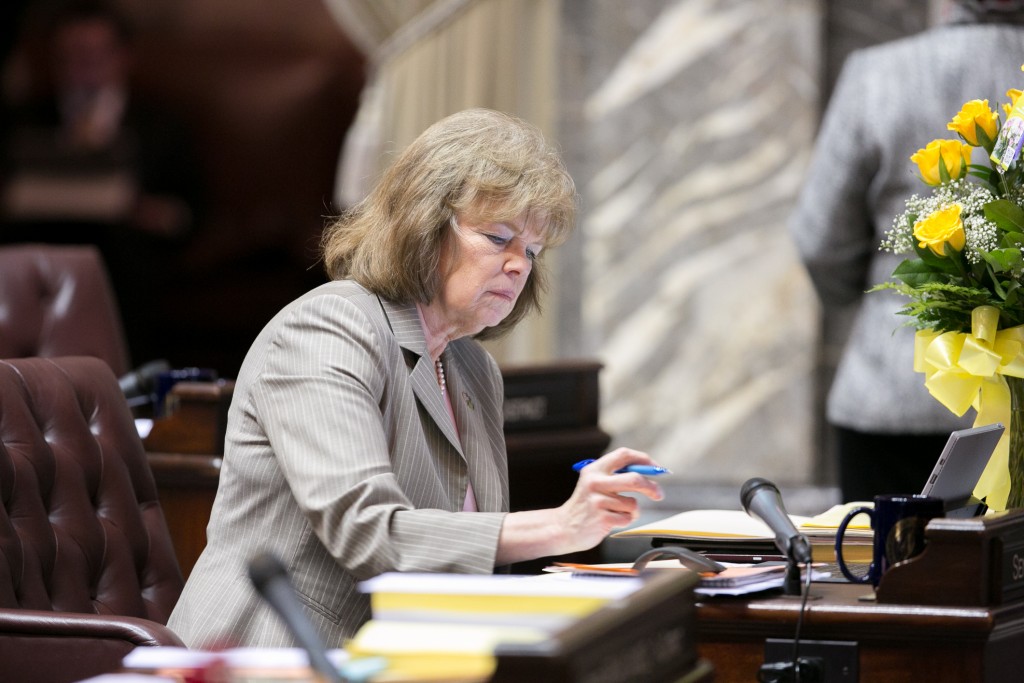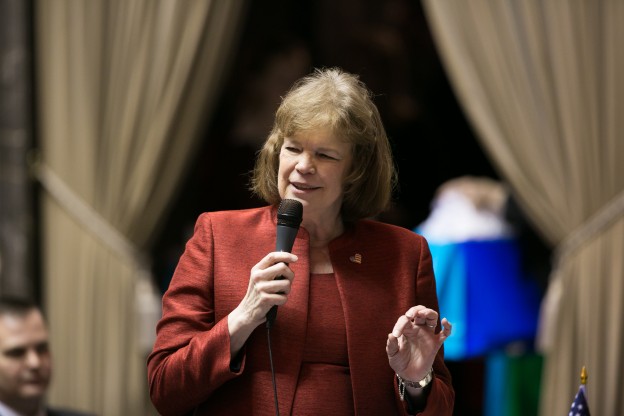|
Tag Archives: Sen. Warnick
The state Senate released a bipartisan capital-budget proposal today for 2015-17 which builds over 2,100 classrooms, devotes $60 million to local-government infrastructure projects statewide and maintains and preserves parks and trails. The $3.9 billion plan would fund the construction and maintenance of capital assets across Washington – such as schools and projects with economic-development value.
“The capital budget is an important component for economic development statewide,” said Warnick- R Moses Lake. “This budget puts money toward building schools and make grants available to local governments to boost their economies. I’m glad to support a strong bipartisan proposal that puts our state’s future on the right track.”
With $254 million more directed to public schools than the House proposal, the Senate plan seeks to support student-achievement efforts by building additional classrooms, the largest chunk being aimed at kindergarten through third grade.
“We demonstrated in the operating budget that our kids come first. The capital budget does the same thing. We put nearly half of the funds toward educational projects like investing nearly $1 billion over the next six years to build over 2,100 classrooms for these students.”
All public-works-board list projects are funded through the Senate proposal, which supports local infrastructure and provides family-wage construction jobs.
“We need to make these investments in our communities if our state is going to continue to be successful. Our proposal protects and invests in our natural resources and will insure that our cities and counties have access to resources to grow their economies. That is critical as our state works to bring the economic recovery statewide. This capital budget is good for our schools, jobs, and community,” said Warnick.
The legislation will be a striking amendment to Engrossed House Bill 1115 which received a public hearing at noon today in the Senate Ways and Means Committee.
You can click here to view a list of projects and locations that are funded in the Senate’s proposed capital budget.
April 7, 2015 |
|||
|
|||

|
The Senate Majority Coalition’s budget proposal was approved Monday afternoon after vigorous debate b efore the weekend where lawmakers worked around the clock. The budget makes education the top priority and delivers tax relief and college affordability to families across Washington without raising taxes.
efore the weekend where lawmakers worked around the clock. The budget makes education the top priority and delivers tax relief and college affordability to families across Washington without raising taxes.
“This budget proposal prioritizes education spending after years of putting money toward other programs. With $3 billion in more projected revenue we do not need to ask tax-payers to send Olympia more money. This budget funds the real priorities of government and I’m glad that we can do so without raising taxes,” said Warnick
The Senate proposal puts job creation and families first compared to the House majority’s plan, which would raise state spending by 15 percent and require a $1.5 billion in tax increases.
“Our proposal puts educating our children first and ensures that we can continue to grow our economy. I do have some concerns about how our budget may impact county and local governments but I will be working to see what we can do to ensure that the final budget protects vital funds for our communities,” Warnick said.
Warnick notes that overall the Senate budget is good for 13th Legislative District by not increasing taxes and focusing on growing jobs in the community.
Budget negotiators will now begin reconciling proposals from the House and Senate no later than Sunday, April 26 for the Legislature to conclude its 105-day session on schedule.
Please take a moment to watch my latest video update. I discuss the 2015 legislative thus far, the recent House budget proposal and legislation still making its way through the process.
Sen. Judy Warnick said the Senate Majority Coalition’s budget proposal is the best path forward for Washington State. The budget makes education the top priority and delivers tax relief and college affordability to families across Washington without raising taxes. Senate budget leaders released their 2015-17 state operating budget proposal today with a pledge to capture savings and keep the state’s economy moving with more investments in education.
“Our state has $3 billion available for state government operations over the next two years, without new taxes. I have been adamant that $3 billion was more than enough to handle the demands facing the state and this budget shows that,” said Warnick
Warnick, R-Moses Lake, noted the Senate’s 2015-17 spending proposal would put more money into funding education – at a 3 to 1 ratio with new money — add mental-health services, as directed by the state Supreme Court, and cut college tuition by 25 percent all without raising taxes on working families and small businesses.
Warnick said the Senate proposal is clearly the best path forward when compared to the House majority’s plan, which would raise state spending by 15 percent and require a $1.5 billion in tax increases.
“I’ve tried to put our state budget in the context of what families across our state are doing. They prioritize. A family or small business that had an increase of over 8 percent would be thrilled. That is the situation we are in. That’s not enough for the leaders of the House majority however. Their approach is saying 3 billion dollars isn’t enough – they want much more,” Warnick said.
Warnick believes the people she serves in the 13th Legislative District will see the Senate budget as a better way to move the state forward: protecting vital services, family budgets and taxpayers.
“We’ve been able to balance the budget without raising taxes because we had the courage to stick to our priorities and live within our means. Special interests that feed off government may prefer the House majority’s budget, but those aren’t the people I’m here to represent.”
Budget negotiators need to reach agreement no later than Sunday, April 26 for the Legislature to conclude its 105-day session on schedule.
Sen. Judy Warnick has been appointed to the Joint Legislative Committee on Drought. Her selection came ahead of Gov. Jay Inslee’s Friday-morning declaration of a drought emergency for the east side of the central Cascade Mountains.
“I spoke with the Department of Ecology about the impending drought declaration and am glad that the governor is prioritizing this issue,” said Warnick, R-Moses Lake. “There may be funding available and we will look at any options to make sure that we can respond proactively to issues raised by the drought.”
According to Inslee’s office, the state Department of Ecology has requested $9 million to address drought relief via emergency water-right permits, transfers and changes to current water rights.
Prior to the drought declaration Warnick, chair of the Agriculture, Water and Rural Economic Development Committee, had scheduled a work session March 23 to discuss drought issues.
“Water access and conservation is something that affects our entire state,” Warnick said. “Drought conditions place pressure on our food supply, our families and communities. We need to find creative and collaborative solutions to make sure we can continue to provide water in critical areas. I will be bringing up these issues in my committee and fighting for relief when the drought committee meets.”
Washington has 62 watersheds, 34 of which are projected to have less than 75 percent normal water supply. Ecology has been working with municipalities to review the watersheds, several of which are in the 13th District.
 Beginning in 2011, the Washington State Department of Agriculture implemented the Animal Disease Traceability to better track animals and locate instances of disease. Senate Bill 5733, sponsored by Sen. Judy Warnick, was approved in a nearly unanimous vote Monday. The measure would implement an electronic livestock transaction system.
Beginning in 2011, the Washington State Department of Agriculture implemented the Animal Disease Traceability to better track animals and locate instances of disease. Senate Bill 5733, sponsored by Sen. Judy Warnick, was approved in a nearly unanimous vote Monday. The measure would implement an electronic livestock transaction system.
“We are using technology to increase safety in our food supply and possibly make the process easier for our farmers,” said Warnick, R-Moses Lake. “The Washington State Department Agriculture is working on final implementation to have timely information regarding the transfer of ownership and traceability in the event of a disease outbreak.”
The legislation allows licenses to electronically report cattle transactions as an alternative to mandatory cattle inspection requirements currently in place. This information is already collected through the mandatory program but the electronic system is viewed as a more efficient approach to collecting data related to transactions.
“This bill makes information about transactions more accessible, more complete, and producers will have that information available. This does not require producers to submit movements to the Department of Agriculture but helps keep records in the event there are issues with livestock health.”
“The Washington Cattlemen’s Association appreciates the efforts and focus that Senator Warnick has made to see that Animal Disease Traceability is able to be implemented in Washington State,” said Jack Field, Executive Vice President of the Washington Cattleman’s Association.
ADT is an important tool that will assist the cattle industry and animal health officials in the event of an animal health event. The cattle industry has worked closely with the WSDA to ensure that all necessary information is captured for ADT. Senate Bill 5733 is a component of ADT and will need to capture the same quality of information that a field inspection captures for the WSDA Lid Program.
Sen. Judy Warnick has been working for two years to boost rural economic development with changes to the Community Economic Revitalization Board. Today the Senate passed Senate Bill 5442 which makes needed changes to the Board’s requirements to improve competitiveness and spur economic growth.
The Board offers financing and grants to local jurisdictions but requires that entities receiving funding demonstrate that permanent private sector jobs created exceed the county median wage. This poses a problem for many rural areas with high paying industries in a portion of the county but other economically depressed areas.
“We have a situation where communities who could really benefit from this program cannot compete,” said Warnick, R-Moses Lake. “This bill will mean a significant difference for rural communities by allowing 25 percent of projects awarded to be exempt from the median wage provision. We should be promoting opportunities to increase jobs and this change will mean more economic opportunity for rural communities. There will be a strong mix of prevailing, median, and near median wage jobs as a result of this legislation.”
Last year, then Rep. Warnick’s bill passed both chambers of the Legislature only to be vetoed. That bill would have provided for 50 percent of the projects awarded to be exempted from the median wage provision.
“This will attract more jobs to our communities and we have engaged with numerous stakeholders to make sure that concerns are addressed. The governor, labor groups and the Department of Commerce have come out in support of this bill to improve our state’s economy.”

























